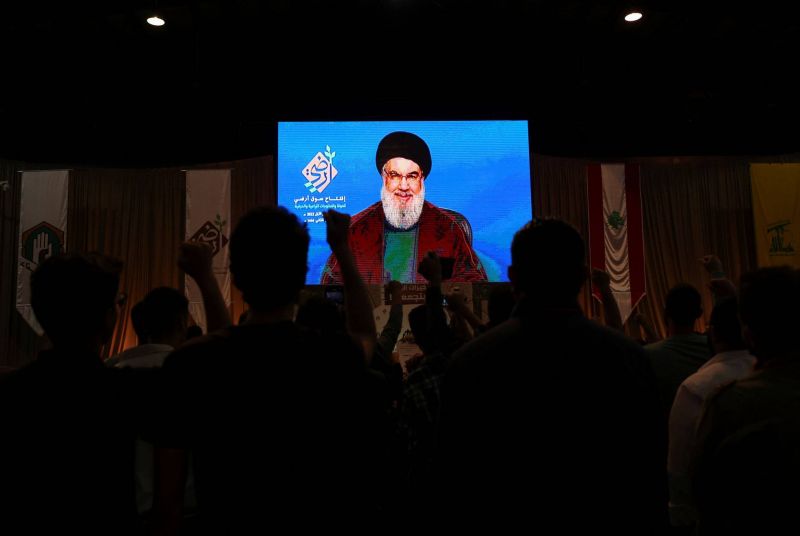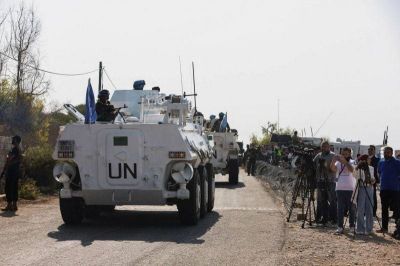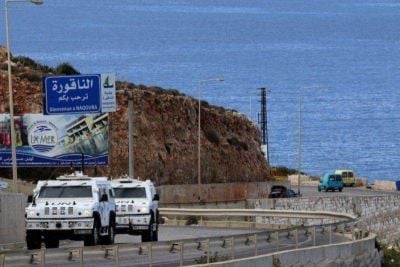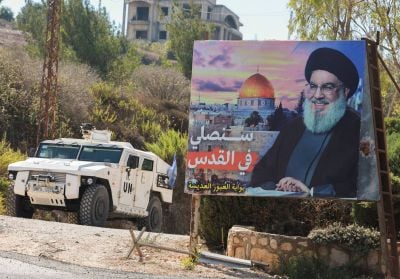
Lebanon's Hezbollah leader Hassan Nasrallah addresses his supporters through a screen during the opening of a local exhibition, in Beirut's southern suburbs, Oct. 27, 2022. (Credit: REUTERS/Mohamed Azakir)
Hezbollah Secretary-General Hassan Nasrallah reaffirmed Saturday night that the maritime border agreement with Israel is a "great historic victory" for Lebanon, but acknowledged that Beirut did not receive all its demands.
He specifically recalled the "line of buoys," is still the subject of disagreement between the two countries.
In a long speech broadcast live on television on Saturday night, the leader of the Shiite party began by tracing the course of negotiations between Israel and Lebanon in recent years, and how the process ultimately led to Thursday's agreement.
'On the brink of war'
"As we said before, this is a great historical achievement for Lebanon, its people and its resistance," Nasrallah said, congratulating himself once again. "Some nights, we were really on the brink of war. This is what the atmosphere of the negotiations was like."
The formal deal signing took the form of two exchanges of letters, one between Lebanon and the United States, and the other between the United States and Israel. This complicated protocol was designed to ensure that the deal signing would not be interpreted as a step toward the normalization of relations between the two neighboring countries.
Under the agreement, the Karish offshore field is located entirely in Israeli waters. Lebanon, for its part, will have full rights to explore and exploit the Qana field, located further northeast, part of which is in Israeli territorial waters. But "Israel will be remunerated" by the firm operating Qana "for its rights over any deposits," according to the text of the agreement.
After the conclusion of the signing Thursday, Nasrallah said in a speech that the deal "represents a great victory for Lebanon" and announced that his party has ended its "exceptional measures" against Israel.
For several months, Hezbollah had increased the mobilization of its armed forces near the border with Israel. Tensions were heightened after the arrival of a gas platform in the Karish gas field in early June, after which both Hezbollah and Israel threatened war.
Line of buoys
"The main thing, for us, is the results. We believe, objectively, that Lebanon, in this last battle ... has achieved everything it wanted, except for one thing that remained unresolved." Nasrallah added in his Saturday night speech.
"We cannot say that Lebanon got 100 percent of what it wanted in this agreement because there is still a small portion of 2.5 km2 that is occupied by the enemy and belongs to our territorial waters. It is Lebanon's duty to work, at all times, to liberate this area. If it is said that Lebanon has obtained 95 percent of what it wanted, this is not an exaggeration," the Hezbollah leader continued.
The "line of buoys" was established by Israel after its withdrawal from southern Lebanon in 2000. In its final amendments to the agreement, Beirut refused to recognize the "line of buoys," while Israel demanded the agreement recognize it. The line was ultimately recognized in the final version of the agreement.
Pending an agreement on the land border, the line of buoys — which Israel says constitutes a security issue — that demarcates the maritime border between the two countries for 6 km before joining Line 23.
No security guarantees
Nasrallah then commented on the political implications of the agreement on the maritime border. He denied once again any normalization with Israel.
"In all that has happened, Lebanon has not given any security guarantees," Nasrallah said. "The enemy has recognized the balance of deterrence."
He added that Israeli Prime Minister Yair Lapid "wants to exaggerate the scope of the agreement by saying that it is a recognition of Israel. But the agreement is a technical issue and not a political one."
On Thursday, Lapid said the agreement constitutes the de facto "recognition" of Israel, to which Lebanese President Michel Aoun responded by saying the agreement is "purely technical."
Nasrallah concluded his speech by threatening Israel once again, stressing that his party has not definitively ruled out the option of war.
"You are mistaken if you think that the resistance in Lebanon has been deterred from attacking," he said. "The resistance is behaving wisely and firmly. But when it is necessary to go to war, the resistance will do so."
On the eve of President Michel Aoun's departure from Baabda Palace, the Hezbollah leader did not mention the head of state's end of term, the ongoing presidential impasse, nor the gridlocked formation of a new government


